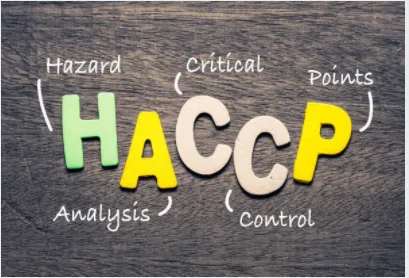Introduction
In India, where the food industry is a vital pillar of the economy, ensuring food safety is critical to protecting public health and fostering consumer trust. The Hazard Analysis and Critical Control Points (HACCP) certification is a globally recognized system designed to prevent food safety hazards through a proactive, science-based approach. As India’s food sector grows, driven by increasing domestic consumption and export demands, HACCP certification has become essential for businesses aiming to meet stringent regulatory and market requirements. From small-scale food processors to large exporters, HACCP provides a framework for ensuring safe, high-quality products. This article explores HACCP certification in India through four key subtopics: its relevance in the Indian food industry, regulatory requirements, benefits for businesses, and the certification process, highlighting its role in elevating food safety standards.
Relevance of HACCP in the Indian Food Industry
India’s food industry is diverse, encompassing agriculture, dairy, meat processing, packaged foods, and ready-to-eat products. With a growing population and increasing global trade, the demand for safe and high-quality food is rising. HACCP certification is particularly relevant in this context, as it addresses food safety challenges unique to India, such as inadequate cold chain infrastructure, varying hygiene practices, and contamination risks in supply chains.
HACCP is endorsed by the Food Safety and Standards Authority of India (FSSAI), which regulates food safety under the Food Safety and Standards Act, 2006. While HACCP certification is not mandatory for all food businesses, it is often required for exporters and those supplying to large retailers or international markets. The system’s focus on identifying and controlling hazards—biological (e.g., pathogens), chemical (e.g., pesticides), and physical (e.g., foreign objects)—ensures that Indian food products meet global standards, such as those set by the Codex Alimentarius. HACCP also aligns with India’s push for quality in initiatives like “Make in India,” enhancing the competitiveness of Indian food exports in markets like the EU, USA, and Middle East.
Regulatory Requirements for HACCP in India
HACCP certification in India is guided by the seven principles of the HACCP system, tailored to comply with FSSAI regulations and international standards. Key requirements include:
-
Hazard Analysis: Food businesses must identify potential hazards at every stage of production, from raw material sourcing to final distribution.
-
Critical Control Points (CCPs): Businesses must pinpoint stages where hazards can be prevented or minimized, such as cooking temperatures or storage conditions.
-
Critical Limits and Monitoring: Measurable limits (e.g., time, temperature) must be set for each CCP, with regular monitoring to ensure compliance.
-
Corrective Actions and Verification: Procedures for addressing deviations and verifying the HACCP plan’s effectiveness through audits and testing are mandatory.
Additionally, businesses must implement prerequisite programs like Good Manufacturing Practices (GMPs), sanitation standards, and employee hygiene training. Compliance with FSSAI’s Food Safety and Standards (Licensing and Registration of Food Businesses) Regulations, 2011, is also essential. For exporters, adherence to international standards like ISO 22000 or buyer-specific requirements may be necessary. Proper documentation, including hazard analysis reports and monitoring logs, is critical for demonstrating compliance during audits.
Benefits of HACCP Certification for Indian Businesses
haccp certification india offers significant advantages for Indian food businesses, enhancing their operational and market capabilities. Key benefits include:
-
Global Market Access: Certification enables businesses to meet the stringent requirements of international buyers, boosting exports of spices, processed foods, and dairy products.
-
Regulatory Compliance: HACCP aligns with FSSAI regulations, helping businesses avoid penalties and ensure compliance with domestic and international food safety laws.
-
Consumer Confidence: Certification signals a commitment to safety, building trust among Indian consumers who are increasingly aware of food safety issues.
-
Operational Efficiency: By streamlining processes and reducing hazards, HACCP minimizes product recalls, waste, and contamination risks, leading to cost savings.
For small and medium enterprises (SMEs), which form a significant part of India’s food sector, HACCP certification enhances credibility, enabling them to compete with larger players. It also supports India’s reputation as a reliable supplier in global markets, contributing to economic growth.
The Certification Process in India
Obtaining HACCP certification in India involves a structured process, typically guided by accredited certification bodies recognized by the FSSAI or international organizations. The key steps are:
-
Gap Analysis: Businesses assess their existing food safety practices against HACCP requirements to identify gaps in processes, documentation, or infrastructure.
-
HACCP Plan Development: A tailored HACCP plan is created, incorporating the seven principles and addressing specific hazards in the business’s operations, such as spice contamination or dairy pasteurization.
-
Implementation and Training: The plan is integrated into daily operations, with employees trained on HACCP principles, hygiene practices, and monitoring procedures.
-
Certification Audit: A third-party certification body conducts a two-stage audit. Stage 1 reviews documentation and readiness, while Stage 2 evaluates implementation through site inspections and interviews. Upon successful completion, certification is granted, typically valid for one to three years, with annual surveillance audits.
The process can take 3–6 months, depending on the business’s size and readiness. Costs vary based on the certification body, business scale, and complexity of operations. Maintaining certification requires ongoing monitoring, record-keeping, and updates to the HACCP plan to reflect changes in processes or regulations.
Conclusion
HACCP certification is a vital tool for ensuring food safety and quality in India’s rapidly growing food industry. By adhering to its rigorous principles, businesses can address the unique challenges of the Indian market, from supply chain complexities to regulatory compliance. The certification not only enhances consumer trust and market access but also drives operational efficiency, making it a strategic investment for food businesses of all sizes. As India strengthens its position in global food trade, HACCP certification plays a pivotal role in aligning with international standards and supporting economic initiatives like “Make in India.” By embracing HACCP, Indian food businesses can safeguard public health, build a competitive edge, and contribute to a safer, more sustainable food ecosystem.






